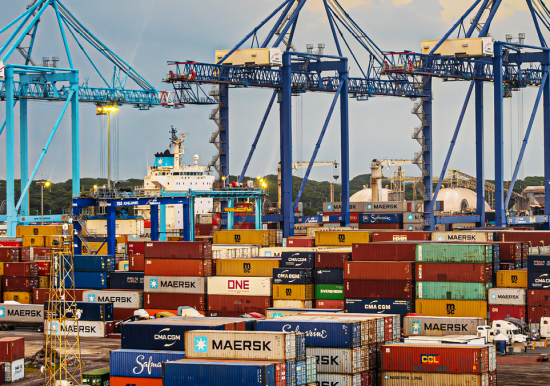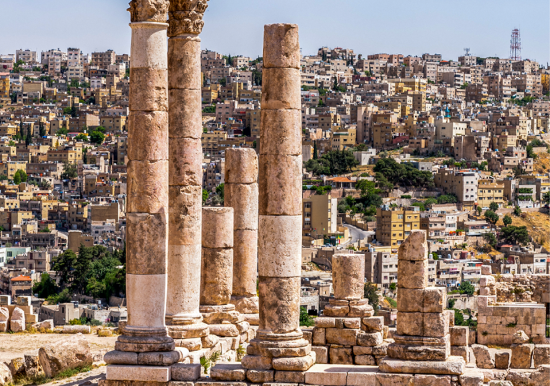
Empowering Judicial Reforms in Costa Rica
Costa Rica is the top-ranked middle income Latin America and Caribbean country in the CGGI and has risen two places this year to rank 40 globally. It ranks joint first for Regulatory Governance, 22nd for Coordination and 20th for Implementation. Justice Damaris María Vargas Vásquez, Vice President of the Supreme Court of Justice of Costa Rica, shares how the country’s Judiciary is a cornerstone of the country’s democracy and a champion of good governance and people-centred justice.
Costa Rica is highly regarded for its judicial independence and freedom from intervention by other institutions, and its courts are trusted by citizens and businesses to settle disputes efficiently. Costa Rica ranks 22nd globally for Robust Laws and Policies and 34th for Quality of Judiciary, rising four places this year. What do you think are the features particular to the Costa Rican system that allow for this independence and efficiency?
Justice Damaris Maria Vargas Vásquez: Costa Rica is a democratic, free, independent, multiethnic and multicultural Republic, as stated in Article 1 of our Constitution. This statement reflects the reality of our country and what it means to be Costa Rican. We have been a country without an army for many, many years – a consolidated democracy of free men and women. We can say, without demagoguery, that the judicial branch of Costa Rica is composed of an independent Judiciary, whose decisions are respected by citizens. The Judiciary is a cornerstone of our democracy.
The foundations of an independent Judiciary were laid by those who wrote our constitution. A key element was to ensure a fixed percentage of the national budget for the Judiciary, so that the budget allocation would not be left to the discretion of political leaders. Another key aspect that ensures the independence of judges is that their appointment is not temporary, it is permanent, so that they will not be indebted to anyone for the free exercise of their constitutional function to administer justice, and will only adhere to the law. They are not appointed on political criteria, but on technical criteria that proves their suitability. The appointment of judges is made by the Judiciary itself, thus respecting the principle of the separation of powers.
The high quality of the Judiciary’s work is a result of our robust professional training that ensures legal professionals are prepared, when necessary, to fill any gaps. Our Judicial School is well recognised across our region, and aims to strengthen the competencies of judges, and their support teams, with the requisite knowledge, skills and attitudes. Similarly, there is a judicial career system, which seeks to ensure the proper and appropriate appointment of judges, and those who replace them in their temporary absences.
You were elected to be the new Vice President of the Supreme Court in January 2023. What are your main goals as Vice President and what are the main challenges facing the country’s courts?
Thanks to the confidence shown in me by my fellow magistrates, I was unanimously elected as Vice President of the Supreme Court of Justice. In response to this trust and above all, based on my own ideals, my goal is to bring added value to the institution. This means I am committed to responsible and honest work, focused on identifying opportunities for improving the administration of justice, finding practical ways to enhance effectiveness and efficiency.
Article 60 of the Organic Law of the Judiciary states that the function of the Vice-Presidency of the Supreme Court of Justice is to replace the person who occupies the Presidency, in their temporary absences. Since my election to this honourable position, I have been at the disposal of the President, as we work together with the same institutional values and efficiency.
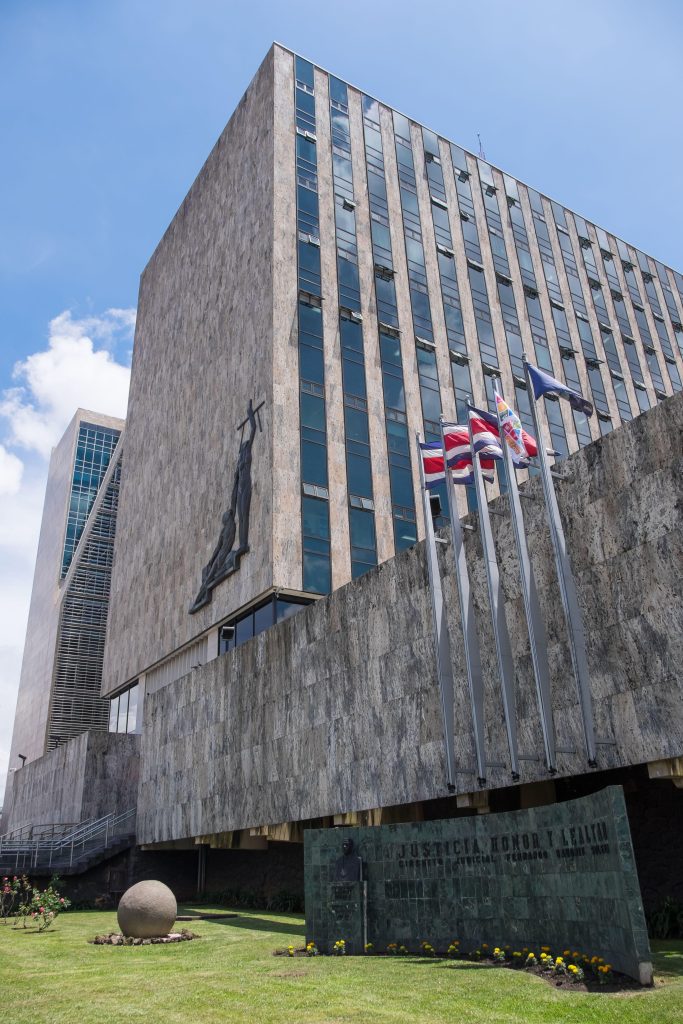
I bring to this role all my experiences from working in the Judiciary in different posts, bodies and regions of the country, for more than 33 years. This has allowed me to know personally, how a judicial office operates, both at the courts and administrative levels. This helps with ideas for modernisation, how to make services more efficient, and how to strengthen the independence of judges.
The Judiciary is also made up of the auxiliary bodies of justice: the Public Prosecutor’s Office, the Judicial Investigation Agency which is the technical police, and the Public Defender’s Office. Their important work strengthens citizens’ confidence in the Judiciary.
The current financial situation that the country is going through means the Judiciary needs use its resources intelligently. We must seek coordinated solutions within and between the public and private sector on economic, social and environmental impact challenges so we can fulfil our Sustainable Development Goals commitments.
Our Constitution mandates prompt, effective and accessible justice which means each of us who work in the Judiciary need to focus on people-centred justice, to use the term preferred by the OECD. This means justice that meets the needs of workers, people in vulnerable situations, businesses and citizens in general.
An area of special interest for me will be to provide more security to citizens and services that meets their needs. Achieving this will require strategic prioritisation and institutional coordination between the Judiciary and the other branches of the State, while safeguarding judicial independence and the separation of powers.
It is worth recognising the institutional coordination work done by the current President of the Supreme Court of Justice and those who have preceded him. The administrative sector of our Judiciary are fundamental and are responsible for planning, IT modernisation, legal support and personnel management. Their technical and advisory expertise supports the work carried out by the Full Court and the Superior Council as well as the Public Prosecutor’s Office, the Judicial Investigation Agency and the Public Defender.
Transparency and institutional efficiency must go hand in hand with ethics. The institutional values of integrity, honesty, responsibility, commitment, initiative and excellence are what should characterise us all as judicial officials. We have a clear Code of Ethics based on our Ethics Policy. We are currently updating some of our other policies, including the Transparency and Anticorruption Policy, the Policy for Simplification and Speed of Procedures, the Citizen Participation Policy, and the Access to Justice Policies for indigenous peoples and people with disabilities, amongst others, which again reflect our focus on people-centered justice.
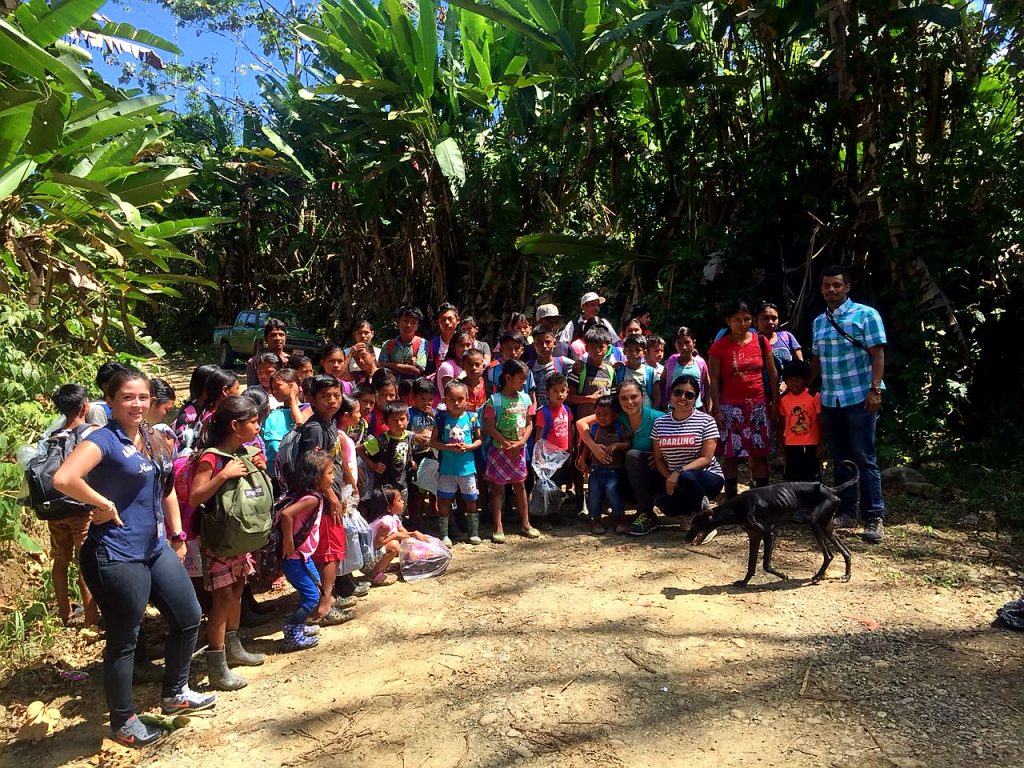
One particular area I would like to prioritise is finding ways to reduce delays in the legal system, which greatly impact our citizens. To this end, I bring a master’s degree in Business Administration, certification in Project Management and more than 10 years of having served as an alternate member of the Superior Council of the Judiciary, in the Council of the Judiciary, and directing the Center for Support, Coordination and Improvement of the Jurisdictional Function. All these experiences give me a more comprehensive view and the chance to achieve greater impact through my work.
I will further be supporting the Presidency of the Supreme Court to promote and manage dialogue between various social sectors. This is a critical issue because space must be given for the protection and defence of the interests and rights of each citizen and the contribution that they can make to a stable society.
My work experience, professional training, as well as having been a university professor for many years, allow me to recognise the importance of having the support of international organisations for planning and implementing public policies. The support of the United Nations system has been invaluable, as has the Ibero-American Judicial Summit and representatives of the different judicial bodies of Ibero-America, among many others that support us. It is very important to strengthen these type of ties and initiatives for identifying potential service improvements based on high international standards.
My life experience as a woman, mother, daughter, sister, and co-worker, among other facets of my life, helps me understand the needs and strengths of justice officials, who work every day to provide for our families. I thank God and my country for the opportunity to be the Vice President of the Supreme Court of Justice of Costa Rica, a function that I honour in my work every day with commitment, responsibility and honesty. Our ultimate goal is to provide an efficient and effective justice service, in line with our constitutional mandate of prompt, effective and accessible justice.
What additional roles did the Supreme Court assume during the recent COVID-19 pandemic and what have the courts learned about maintaining the rule of law in a crisis?
Faced with the national and global COVID-19 emergency, the judiciary remained a constant and effective cornerstone of our democracy. Thanks to our state-of-the-art technology, the Judiciary knew how to act immediately in the pandemic by creating protocols for each of the criminal, labour, administrative disupte, civil, family, and agrarian courts. Hearings were held virtually to guarantee, continuity of service. This also protected the lives of court officials and citizens in general, respecting social distancing guidelines from the Ministry of Health.
Remote working, which we had already implemented for our workers, was also boosted with more robust regulations and secure technology. All these protocols have clear rules for action, especially for helping people in vulnerable situations, in line with our focus on people-centred justice.
In your career, you were appointed to be a trial judge in various parts of the country, which you have described as a very hands-on role. Do you think that practical field exposure is beneficial for the training and development of judicial officials and judges and, if so, how could it be incorporated into the development programmes of the judiciary?
My goal has always been to generate a people-centered model in administering the law – for open and participatory justice. I began my work as first instance judge in the agricultural courts located in different parts of the country, with hearings not held in court rooms, but in the actual places where the disputes had originated.
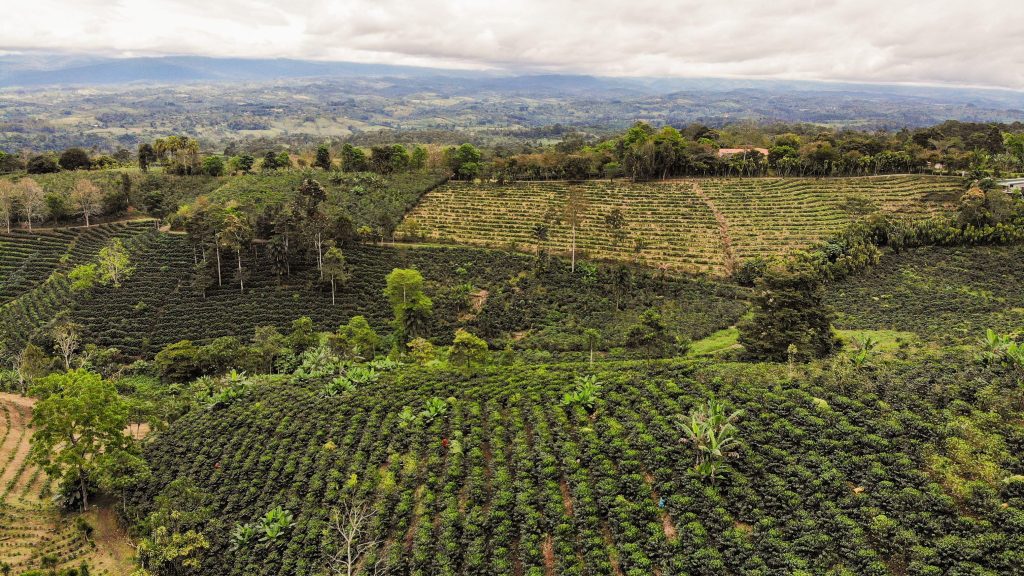
Interacting with the people directly whose lives are impacted by a local conflict, usually on their own properties, allows you to get immersed in the ways of life of those involved, such as their customs and their perspectives. This helps in finding a solution that really responds to citizens’ needs. It fundamentally adds value and engenders trust in the justice system from those people involved in disputes. It is not pretending to solve a problem from behind a desk in some cold and distant office. Similarly, it helps in seeking out restorative solutions and alternative forms of conflict resolution that are led by the Judiciary.
With the passage of time and my promotions in the Judiciary to Magistrate of the First Chamber of the Supreme Court of Justice, I always kept my focus on people-centred justice, with my doors always open to citizens that need to be heard beyond a courtroom file that sometimes doesn’t reflect their reality and their vulnerabilities.
People-centered justice comes about through projects where institutional policies are co-created and developed hand in hand with the populations who are impacted. It takes into account their vision of the world and their most pressing problems. We also listen closely to the respective inputs of judicial servants from various regional headquarters. Accountability is essential for continuous improvement, so I always try to emphasise this through my work and in developing programmes for the judiciary.
Outside of your Supreme Court duties you have been involved in conservation work as Coordinator of the Institutional Commission for Environmental Management. You represented the Costa Rican Judiciary in the Environmental Justice Commission of the Ibero-American Judicial Summit and as a member of the World Union of Environmental Judges. What is the role of national courts in the field of environmental justice?
Outside of your Supreme Court duties you have been involved in conservation work as Coordinator of the Institutional Commission for Environmental Management. You represented the Costa Rican Judiciary in the Environmental Justice Commission of the Ibero-American Judicial Summit and as a member of the World Union of Environmental Judges. What is the role of national courts in the field of environmental justice?
Addressing the climate crisis must be a priority for the country. The Judiciary is the guarantor of compliance with national and international regulations. Costa Rica is a country committed to the environment. For this reason, our constitutional law declares that international human rights conventions are above the national Constitution, since the protection of natural resources is a global issue.
I have been involved in protecting nature throughout my legal career. I have had the great opportunity to actively participate in national and international fora that analyse diverse and relevant Environmental Law concerns.
My fellow magistrates honoured me by appointing me Coordinating Magistrate of the Institutional Environmental Management Commission. The Judiciary has met the standard for “Environmental Excellence”, granted by the Ministry of Environment and Energy, thanks to our Environmental Management Plan. We have been awarded the Ecological Blue Flag for several years by maintaining and promoting good environmental practices in our Judiciary buildings in the greater metropolitan area, and in some other regions. We aim to get this award country-wide for all our courts and offices.
Costa Rica has a strong reputation in the international arena as a patron of the environment. There is a very high level of confidence in the region for the work of our Judiciary and our robust environmental protection laws that are upheld in our Cassation Chambers, the Constitutional Chamber and the country’s main courts.
The Costa Rican Judiciary is part of the Ibero-American Judicial Summit, where common issues that impact judiciaries are discussed. The Environmental Justice Commission of the Summit analyses environmental issues and currently brings together Brazil, Argentina, Mexico, Uruguay, Spain, Dominican Republic and Costa Rica. The representatives of these countries honoured me by appointing me Coordinator of the Environmental Justice Commission. Together we spearhead projects and good practices that consolidate environmental justice in our respective administrations to meet the needs of our shared planet.
In June 2010, the right to water and sanitation was recognised by the United Nations General Assembly. Water must be in sufficient quantity for safe, acceptable and affordable domestic and personal use (between 50 and 100 litres of water per person per day), the cost of which must not exceed 3% of household income, and be physically accessible within 1,000 metres, and its collection must not exceed 30 minutes. As the World Conservation Union (IUCN) points out, when resolving legal conflicts related to water, environmental protection principles must be upheld as a progressive and never regressive right.
In Costa Rica, the prioritisation of water usage for the general population, has long been in our Constitution. In 2018, I participated in the World Water Forum held in Brazil. I represented the Judiciary of CostaRica in approving the Brasilia Declaration on Water Principles which establishes the way forward for protecting water resources.
Water is a fundamental aspect of sustainable development, for socioeconomic development, energy, food production, ecosystems and species survival. The Brasilia Declaration was discussed again at the UN Water Conference in March 2023. This virtual event convened judges from around the world to analyse environmental law and the role of the Supreme Courts of Justice in guaranteeing access to water as a fundamental right for all people, especially those in vulnerable conditions.
Water is a fundamental aspect of sustainable development, for socioeconomic development, energy, food production, ecosystems and species survival.
Justice Damaris Maria Vargas Vásquez, Vice-President, Supreme Court of Justice of Costa Rica
During this forum, I participated in my capacity as a member of the World Environmental Institute, as Coordinator of the Environmental Justice Commission of the Ibero-American Judicial Summit and representative of the Institutional Environmental Management Commission. Law experts and academics from all parts of the world took part, including Brazil, Argentina, the Philippines, Mexico and the United States.
Being a university professor for several years as chair of Environmental Law has also allowed me to keep up to date with the subject, and at the same time, feedback the work I do from and to the Judiciary.
You were the first Director of Costa Rica’s Center for Support, Coordination and Improvement of the Jurisdictional Function. Can you tell us more about the purpose of the Center and some of your key accomplishments there?
The Center for Support, Coordination and Improvement of the Jurisdictional Function (CACMFJ) was created based on recommendations made by the Judicial Audit. It strengthens the Judiciary by acting as a centralised office with two main functions. One deals with improving the coordination and planning for courts and tribunals throughout the country. The other provides support in appointing qualified substitute judges to ensure continuity of service in the event of temporary absences.
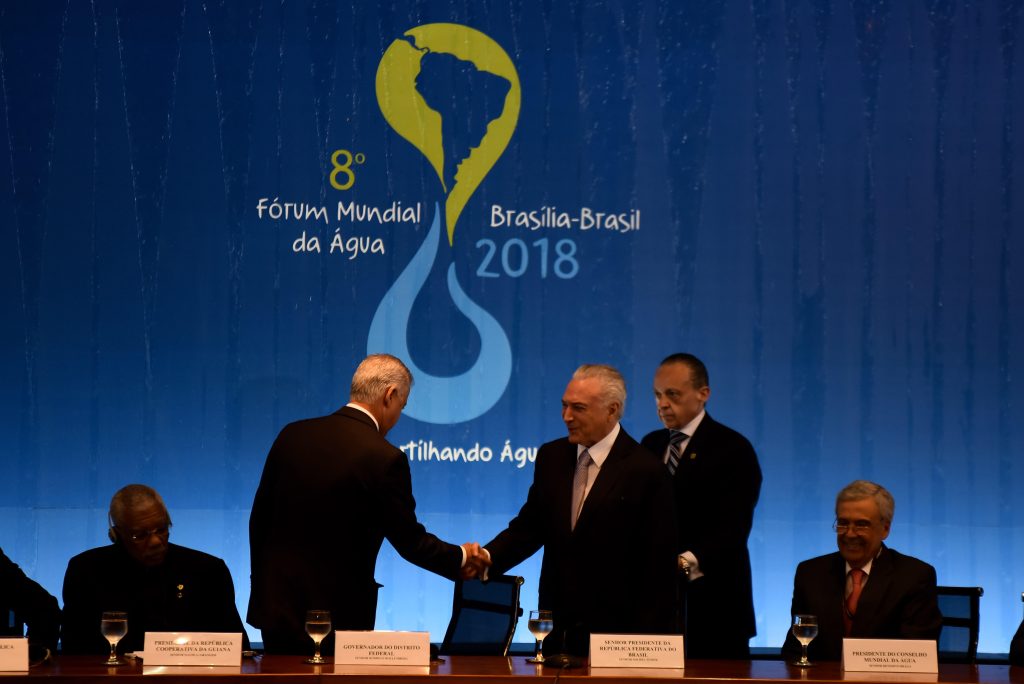
The CACMFJ controls and monitors all the courts and tribunals in the country and has a team of judges that it can deploy, based on requirements, which allows for a more agile public service. It also monitors and evaluates the compliance of each judge, and courtroom, against set performance management indicators.
I had the honour of being the first Director of the CACMFJ, and was appointed by the President of the Supreme Court of Justice. It well suited my experience both as a judge of first and second instance and my formal training in management and administration.
One proposed reform is the use of more Artificial Intelligence (AI) in courts. How does Costa Rica’s judiciary plan to use AI to serve the public and expedite justice?
Artificial Intelligence has been used in the Judiciary for a long time, but has been further promoted in the post-pandemic period, such as in offices that handle collections of legal documents. It can help with some repetitive tasks and for monitoring feedback, but always under the direction of staff.
Effective implementation of AI depends on the tech resources available and the institutional openness to innovation. Once AI is seen to perform well in a given function, we can proceed to roll it out more securely elsewhere.
My experience as coordinating judge of the Civil Jurisdiction and Judicial Collection Commission has allowed me to see the great advantages of AI in practice. One example is a model that was piloted in the Collection Court in Pérez Zeledón, and is now being replicated in other offices in the country. Other institutions making use of AI include the Judicial Investigation Agency (OIJ), and OIJ-Court Liaison Commission, to support their investigations of criminal proceedings.
AI will undoubtedly bring greater work efficiency; however, we believe it must be administered in an appropriate manner that can adjust to the real-life situations of citizens, especially vulnerable people, in line with the principle of people-centered justice.

Justice Damaris Maria Vargas Vásquez
Vice-President, Supreme Court of Justice of Costa Rica
Justice Damaris Maria Vargas Vásquez is Vice-President of the Supreme Court of Justice of Costa Rica and Magistrate of the First Chamber of the Supreme Court. Justice Vásquez Vargas also serves as Director of the Environmental Policy Project of the Judiciary, Director of the Political Access to Justice Project for Indigenous Villages, and Director of the Access to Justice Policy Project and Equal Opportunities for People with Disabilities. Her specialisation in Environmental Law has led her to serve as Coordinator of the Ibero-American Environmental Justice Commission, as Coordinating Magistrate of Costa Rica’s Institutional Commission for Environmental Management and as a member of the World Union of Environmental Judges.
More Stories


Global Influence & Reputation Country Snapshot: Türkiye
